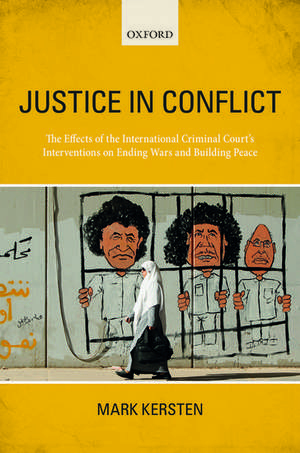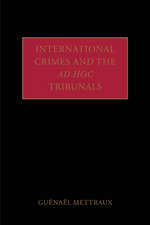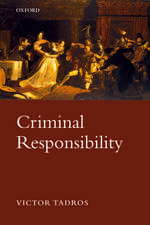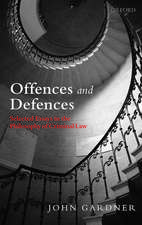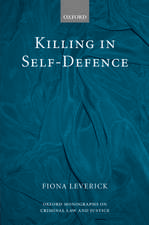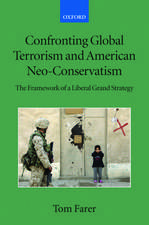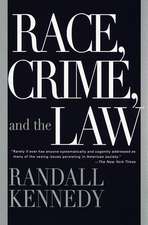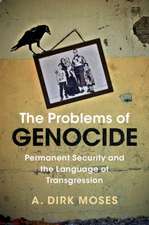Justice in Conflict: The Effects of the International Criminal Court's Interventions on Ending Wars and Building Peace
Autor Mark Kerstenen Limba Engleză Paperback – 16 iun 2016
Toate formatele și edițiile
| Toate formatele și edițiile | Preț | Express |
|---|---|---|
| Paperback (1) | 305.53 lei 11-16 zile | |
| OUP OXFORD – 16 iun 2016 | 305.53 lei 11-16 zile | |
| Hardback (1) | 599.31 lei 32-37 zile | |
| OUP OXFORD – 15 iun 2016 | 599.31 lei 32-37 zile |
Preț: 305.53 lei
Nou
Puncte Express: 458
Preț estimativ în valută:
58.46€ • 60.92$ • 48.41£
58.46€ • 60.92$ • 48.41£
Carte disponibilă
Livrare economică 03-08 martie
Preluare comenzi: 021 569.72.76
Specificații
ISBN-13: 9780198777151
ISBN-10: 0198777159
Pagini: 272
Dimensiuni: 155 x 234 x 15 mm
Greutate: 0.39 kg
Editura: OUP OXFORD
Colecția OUP Oxford
Locul publicării:Oxford, United Kingdom
ISBN-10: 0198777159
Pagini: 272
Dimensiuni: 155 x 234 x 15 mm
Greutate: 0.39 kg
Editura: OUP OXFORD
Colecția OUP Oxford
Locul publicării:Oxford, United Kingdom
Recenzii
Kersten provides a compelling and perceptive examination of one of international criminal justices most difficult conundrums... It is remarkable, I think, that after having produced one of the most sophisticated recent studies on the debate, Kersten arrives at the following conclusion: there may never be a consensus regarding the effects of the ICC on peace, justice and conflict processes.
The book contains a remarkable 43-page bibliography that will be an asset in the hands of scholars, practitioners and policymakers in the areas of international criminal justice, conflict resolution and peace and conflict studies. This value is reinforced by the analytical index, the list of interviews and a series of tables summarizing the ICC interventions and the main arguments provided by the author.
Kersten's book is highly recommended reading for all those who are interested in the ICC, and indeed in international courts in general, and who wish to develop a clearer understanding of how the court functions in a political context.
This outstanding book is one of very few sustained studies of the operation of the International Criminal Court and its role in international politics. Kersten makes two critical contributions to existing scholarship: a sophisticated and nuanced theorisation of the relationship between peace and justice, and an analysis of the ways in which the Office of the Prosecutor negotiates its own interests alongside the interests of States Parties and the UN Security Council, which have profound effects on target selection and therefore on the quality of justice delivered. Written in a clear and engaging style and based on extensive first-hand research, it will be invaluable to students, scholars and practitioners who want to understand why the ICC behaves as it does and what the impact of the Court is upon conflict, peace and international politics.
Based on extensive original research from the situations in Uganda and Libya where the ICC prosecutor pushed for justice at the same time political actors negotiated for peace, Mark Kersten shows that the pursuit of both objectives did not undermine the realistic prospect of achieving either. Justice in Conflict urges a "fact-based " rather than "faith-based " approach to peace and justice and should encourage the international prosecutor and diplomat to work in ways that will help rather than hinder their chances for mutual success.
Mark Kersten brilliantly moves forward the peace vs. justice debate by offering a nuanced and fine-grained analysis of the ICC's impact on conflict. Focusing on Uganda and Libya, he analyses how state and non-state actors seek to deploy the power of the ICC to legitimize their own goals and shape the conflict narrative. This is essential reading for anyone who wants to understand the political and legal space that the ICC occupies and must navigate.
Kerstens nuanced analysis depicts the ICC as a conflicted court acting in conflict zones. Through an engaging and accessible style, he convincingly shows that the implications of pursuing during-conflict justice are varied and fluid, rather than dichotomous and deterministic. With the rising chorus of calls for international criminal justice in various countries, ranging from Syria to Israel/Palestine to Colombia, Kersten urges readers to maintain a healthy skepticism when categorical, and often ideological, assertions are made regarding both the positive and negative effects of ICC interventions... Kersten offers a refreshing contribution to the growing literature on the politics of international criminal justice.
The book contains a remarkable 43-page bibliography that will be an asset in the hands of scholars, practitioners and policymakers in the areas of international criminal justice, conflict resolution and peace and conflict studies. This value is reinforced by the analytical index, the list of interviews and a series of tables summarizing the ICC interventions and the main arguments provided by the author.
Kersten's book is highly recommended reading for all those who are interested in the ICC, and indeed in international courts in general, and who wish to develop a clearer understanding of how the court functions in a political context.
This outstanding book is one of very few sustained studies of the operation of the International Criminal Court and its role in international politics. Kersten makes two critical contributions to existing scholarship: a sophisticated and nuanced theorisation of the relationship between peace and justice, and an analysis of the ways in which the Office of the Prosecutor negotiates its own interests alongside the interests of States Parties and the UN Security Council, which have profound effects on target selection and therefore on the quality of justice delivered. Written in a clear and engaging style and based on extensive first-hand research, it will be invaluable to students, scholars and practitioners who want to understand why the ICC behaves as it does and what the impact of the Court is upon conflict, peace and international politics.
Based on extensive original research from the situations in Uganda and Libya where the ICC prosecutor pushed for justice at the same time political actors negotiated for peace, Mark Kersten shows that the pursuit of both objectives did not undermine the realistic prospect of achieving either. Justice in Conflict urges a "fact-based " rather than "faith-based " approach to peace and justice and should encourage the international prosecutor and diplomat to work in ways that will help rather than hinder their chances for mutual success.
Mark Kersten brilliantly moves forward the peace vs. justice debate by offering a nuanced and fine-grained analysis of the ICC's impact on conflict. Focusing on Uganda and Libya, he analyses how state and non-state actors seek to deploy the power of the ICC to legitimize their own goals and shape the conflict narrative. This is essential reading for anyone who wants to understand the political and legal space that the ICC occupies and must navigate.
Kerstens nuanced analysis depicts the ICC as a conflicted court acting in conflict zones. Through an engaging and accessible style, he convincingly shows that the implications of pursuing during-conflict justice are varied and fluid, rather than dichotomous and deterministic. With the rising chorus of calls for international criminal justice in various countries, ranging from Syria to Israel/Palestine to Colombia, Kersten urges readers to maintain a healthy skepticism when categorical, and often ideological, assertions are made regarding both the positive and negative effects of ICC interventions... Kersten offers a refreshing contribution to the growing literature on the politics of international criminal justice.
Notă biografică
Mark Kersten is a researcher, teacher and consultant currently based at the Munk School of Global Affairs, University of Toronto, Canada. Mark holds a PhD in International Relations from the London School of Economics (2014). In 2011, Mark founded the blog Justice in Conflict , which regularly publishes articles on the challenges of pursuing accountability and justice in the context of ongoing violent political conflicts. Mark's research features regularly in publications such as Foreign Policy, The Washington Post, and the Globe and Mail. He has taught courses on genocide studies, the politics of international law, diplomacy, and conflict and peace studies at the London School of Economics and SOAS. In addition, Mark is the Director of Research at the Wayamo Foundation.
